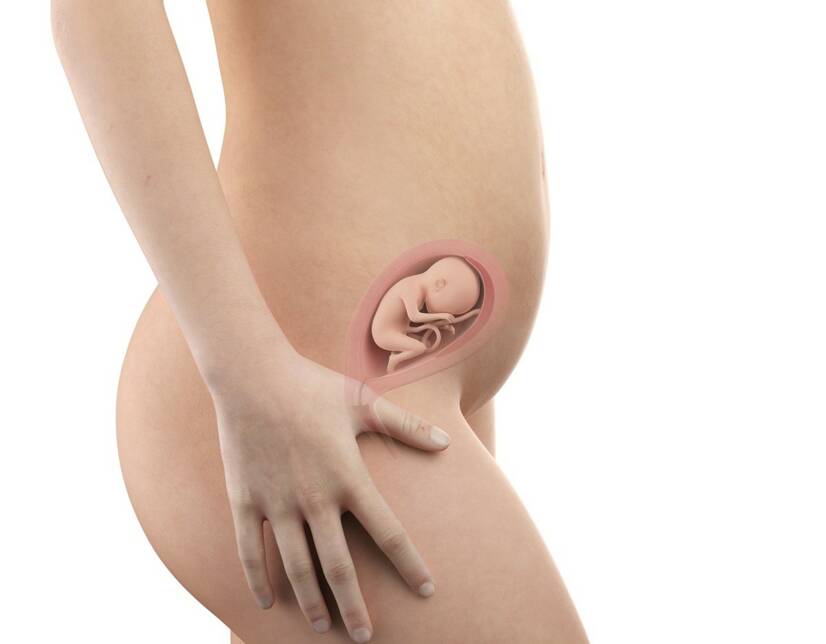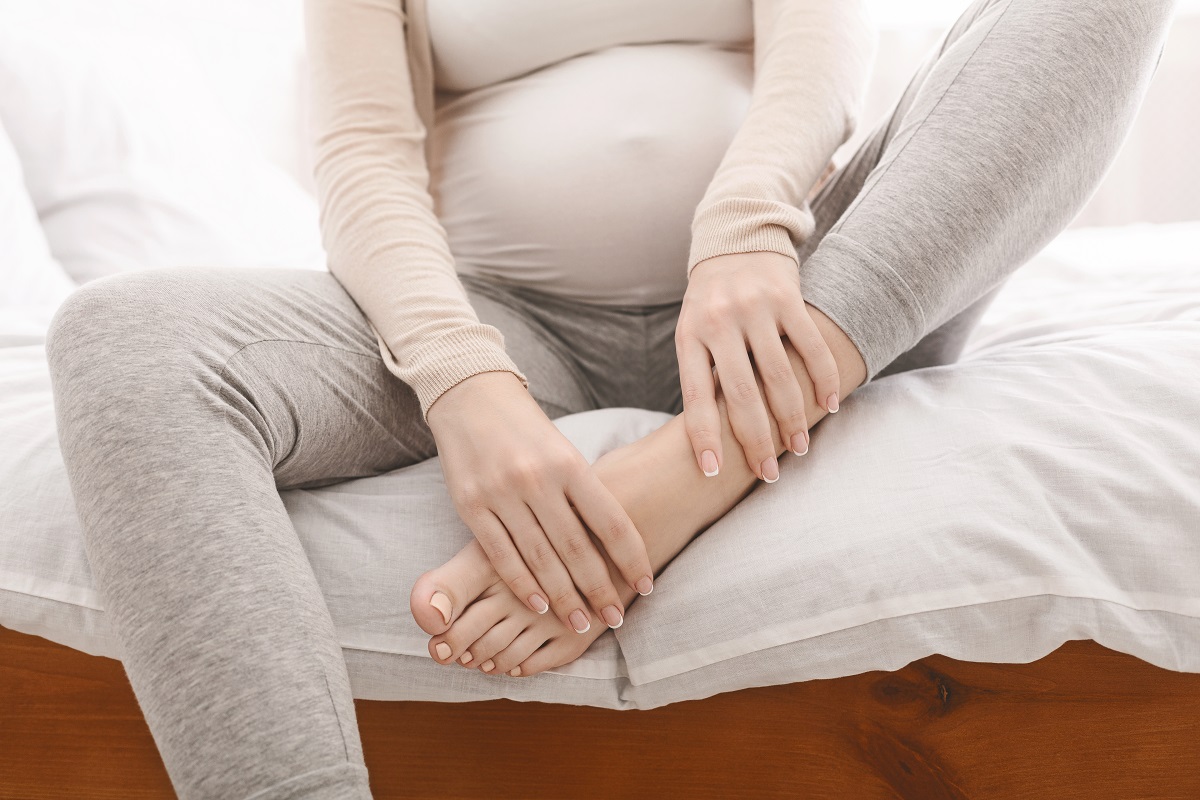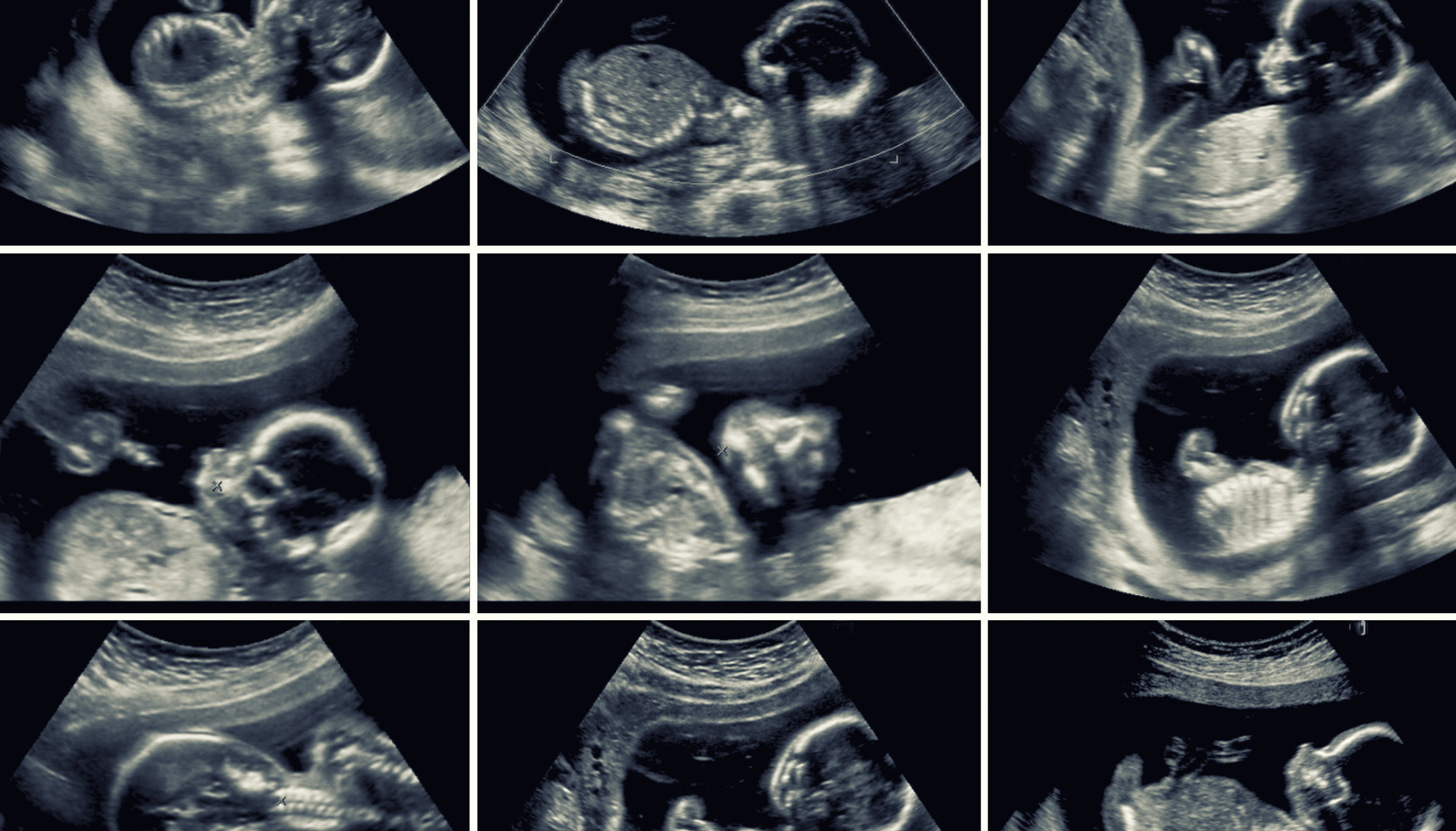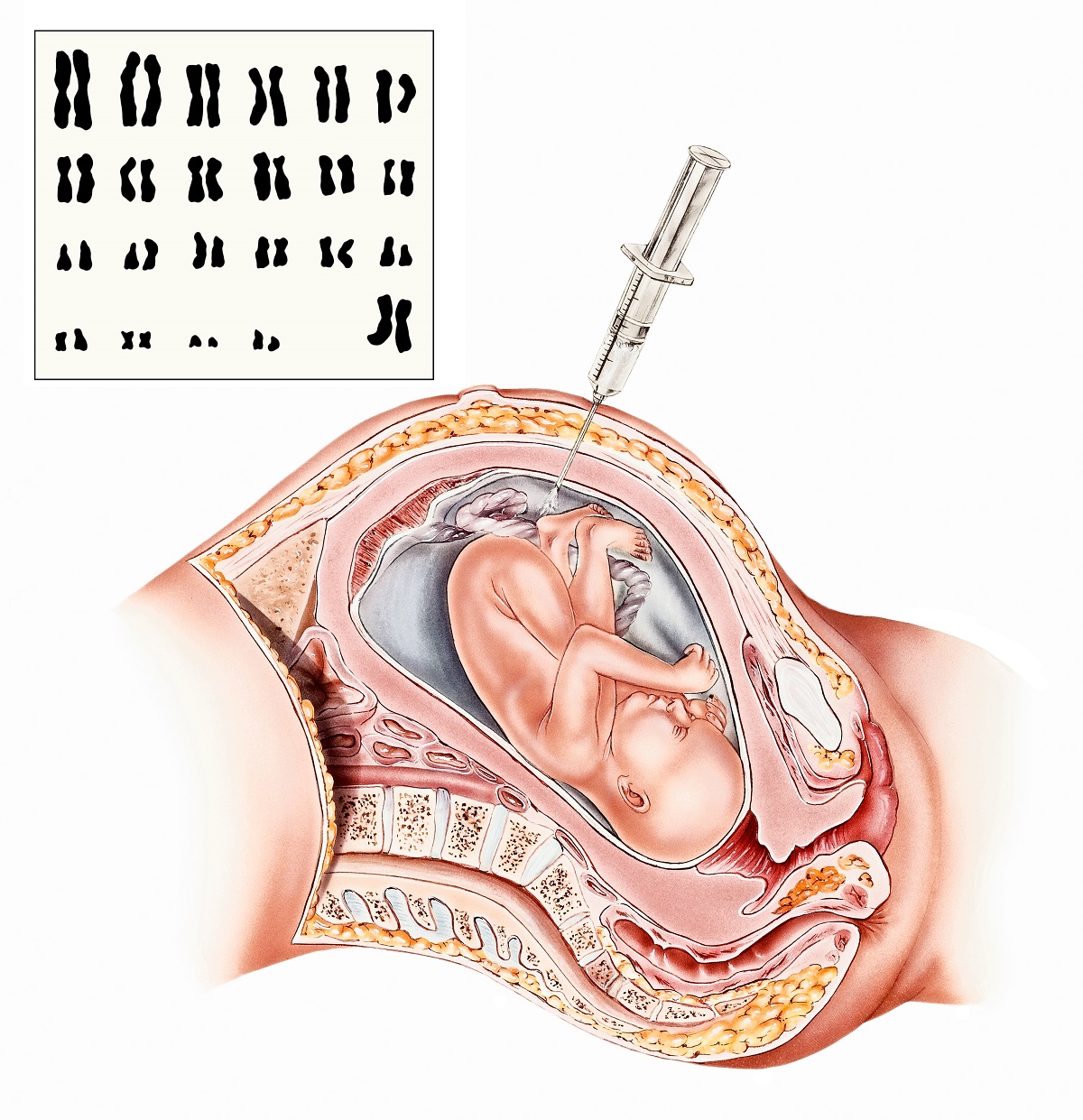- eurogentest.org - Amniocentesis
- whattoexpect.com - 20 Weeks Pregnant
- verywellfamily.com - Week 20 of Your Pregnancy
- nhs.uk - Week-by-week quide to pregnancy
Week 20 of pregnancy: what examinations await you this week?

The 20th week of pregnancy is here. Morning sickness is probably no longer bothering you. You can enjoy a pleasant period of pregnancy with a growing tummy that does not yet restrict you.
Article content
20 weeks pregnant, you're five months along and exactly halfway through your pregnancy.
How's your baby developing in your tummy?
Your baby is growing rapidly and may have already reached a length of 25 cm and a weight of approximately 300 g.
She is growing bigger and stronger every day.
The foetus sleeps most of the day, but when it is awake it makes itself known. It still has plenty of room to kick, roll and do acrobatic stunts in the tummy.
His muscles are gradually developing and the baby is beginning to control his movements.
He's a finished little man, just a little more development and in a few weeks you'll be holding him in your arms.
The number of fetal nerve cells is already the same as in an adult.
All the layers of his skin are already formed, as well as the hair follicles. The first hairs are starting to grow on his head.
On the skin, the vernix caseosa continues to form. This is a white waxy layer of sebum that protects the fetus from getting wet in the amniotic fluid.
Sweat glands are also forming.
The mammary glands begin to appear and the nipples are faintly visible.
Its bones gradually harden by the deposition of calcium obtained from the mother.
The gallbladder produces bile to help with the digestion of nutrients.
His lungs continue to develop.
By this week, the so-called cochlea (hearing organ) has formed in the ear and has reached the same size as an adult.
From now on, your baby will respond to all sounds outside the womb.
Teething begins to develop.
In the womb, the baby is constantly moving around and putting his finger in his mouth, sucking it. He is practising the sucking reflex that he will need after birth to be able to receive breast milk.
His reproductive system has developed considerably.
If you are expecting a girl, her uterus is already formed at this time and the development of the vaginal canal begins. There are already approximately 6-7 million primitive eggs in the small ovaries. After birth, their number drops to 1 to 2 million and will continue to drop throughout the woman's life.
If you are expecting a boy, his testicles are located in the abdominal cavity. Gradually they begin to descend into the scrotum, which is still growing.
How does a woman feel in the 20th week of pregnancy?
Your tummy is growing and forming, and it will no longer be overlooked by those around you.
Your uterus reaches down to your navel. A dark discoloration may appear on your skin from pubic bone to navel in the form of a line.
You may have felt the baby's movements in the previous week. If not, this week you will most likely start to feel them. You may feel his kicking as a little tickle in your tummy or as a moving bubble.
If you haven't felt the movements yet, you don't need to worry. The first noticeable movements can come any time up to the 22nd week of pregnancy.
Did you know that the first movements of the fetus begin to trigger the mother's awareness of pregnancy and the development of new life in the womb? This triggers an even greater emotional attachment to the baby in the mother.
First-time mothers feel fetal movements most often at 20 weeks of pregnancy; second- and multiparous mothers can often identify fetal movements from 18 weeks onwards.
Your weight is gradually increasing. This is not a sign of increased food consumption, but the baby is also gaining weight. The uterus, placenta, amniotic fluid, increased blood volume and breast tissue also have their own weight.
You've already been through the morning sickness and the lack of appetite. Now your appetite has increased, and there's the mixing of flavours. You'd have an ice cream, you wouldn't even finish it, and you'd have a slice of cheese. Yes, it's funny, but it's perfectly normal in pregnancy. Some pregnant women don't understand that they've started craving foods they wouldn't have eaten before, or unusual combinations of foods. But you're pregnant, and your body knows what it wants. Just be careful not to give yourself an upset stomach.
You may experience heartburn or indigestion. Try to avoid overeating and heavy food. Rather, eat more often, in smaller portions of more easily digestible food, to ensure that you and your baby, who needs adequate nutrients to grow, are sufficiently nourished.
You can read more in the article.
Increased fatigue, weakness and insomnia. Your body is working harder than before pregnancy, so you are more likely to get tired. Some women are also troubled by insomnia. It is often associated with too much thinking and worrying about what will happen, how the whole pregnancy will go, what it will be like when the baby is born. Talk about your feelings with someone close to you who will listen to you. And above all, don't worry about the little things, you as a mother can handle it.
Stretch marks can start to appear in the breasts and hips from sudden weight gain in these areas. By lubricating and gently massaging the skin, you can partially avoid them.
Swelling of the gums often occurs in pregnant women and you may even notice bleeding when brushing your teeth. You may also be surprised by nosebleeds at any time of the day, which is caused by increased blood supply to the mucous membranes.
Bloating, flatulence and constipation are sometimes accompanied by abdominal cramps and pain in the bowel area. This can be caused by hormones, an enlarging uterus that puts pressure on the bowel, but also by the restriction of movement by an enlarging tummy.
Your breasts get bigger and may be more sensitive.
You may experience hot flashes, which are caused by increased hormone levels.
The lightheadedness and dizziness is caused by the hormone progesterone, which is supposed to increase blood flow to the fetus. This lowers your blood pressure and blood flow to the brain, and that is what causes the dizziness.
Headaches can sometimes trouble you especially in warm environments, from overheating or in poorly ventilated areas. Reaching for the pill is also not the best solution. The reason for the headache is probably pregnancy hormones, lack of sleep, increased hunger, low blood sugar, but also stress.
If you suffer from frequent headaches, inform your doctor about it. It can be the cause of increased blood pressure and a symptom of pre-eclampsia. Getting enough fluids also has an effect on relieving the pain. If you have not drunk enough water during the day, it may show itself in this form. If the pain does not stop, try lying down in a dark, quiet room and applying an ice pack to your forehead or neck.
Read more about headaches in the article.
Cramps in the calves and legs can wake you up during sleep. They often start in the second trimester and continue until the end of pregnancy.
Leg cramps can be caused by a deficiency of ions such as phosphorus, calcium or magnesium, but also from pregnancy fatigue, from the increased weight from carrying a pregnant belly, as well as from pregnancy hormones.
How to avoid cramps in pregnancy?
Try stretching exercises for your legs before sleep, try to rest during the day, put your feet up on a pillow and eat a balanced diet with plenty of vitamins and minerals.
If you have cramps, straighten your legs and pull your toes together, stand on a cold floor or try a cold compress.
Swelling in your ankles and feet prevents you from putting on your favourite shoes because your foot won't fit in them. Mild swelling of the feet is more likely to occur in the evening or in warm environments. To relieve swollen feet, avoid sitting or standing for long periods of time. Walking and resting with your feet outstretched is the best solution.
If you are bothered by swelling in your feet or hands, consult your doctor. It is the swelling that may be one of the symptoms of pre-eclampsia.
If only one leg swells, visit the hospital. It may be a blood clot in a vein.

Urinary tract inflammation and vaginal infections may occur more often in pregnancy. If you notice a change in the colour of the discharge or its smell, itching in the genital area, it may be a vaginal infection.
Inflammation of the urinary tract is accompanied by a constant sensation on urination with a burning, stinging sensation during and after urination. In such cases, see a doctor to prescribe the most gentle medication for you and your baby.
What can you notice?
Your nails are stronger and your hair has started to grow faster, they are thicker and nourished thanks to the pregnancy hormones that increase circulation to provide sufficient nutrition to the hair and nail cells.
Chloasma, the dark pregnancy spots, may start to form on your face. Limit your exposure to the sun and use skin creams with a high SPF. Add a regular intake of vitamin C to your diet, which is good not only for the body but also for the skin and reduces the formation of dark spots.
Your skin may be more oily.
Mood changes.
One minute you feel fine with a smile on your face, the next you feel like crying and the next you start to get nervous. These mood swings are normal in pregnancy. Some women don't even notice them, others could talk about their mood swings, as could their partners. All you have to do is hang on until the hormones settle down. After a few months, you and your partner will just laugh about it.
The hypersensitivity of pregnancy hormones can throw you for a loop. You see a picture or a film clip and tears start rolling down your face. A baby crying on the playground or a change in your partner's tone of voice can make you cry.

What kind of examinations are waiting for you in the 20th week of pregnancy?
In the antenatal clinic, the nurse will measure your weight, your blood pressure, check your urine with a quick test for protein. Your doctor will ask about swelling, your symptoms and any difficulties that have accompanied you during pregnancy.
If you suffer from headaches, swelling, a hardening sensation in the abdomen, discomfort in the genital area, inform your gynaecologist.
The doctor will palpate your abdomen to check the size of the uterus and its hardness. He may also measure it from the pubic bone to the top of the uterus, which is at the level of the navel in the 20th week.
He will ask you if you have felt the baby's first movements and record this on your pregnancy chart.
At 20 weeks, a second detailed sonographic examination of the fetus, called a morphological ultrasound, is carried out to check for abnormalities. The rate of development of the fetus, the appearance of its body and organs, its activity, the umbilical cord, the amount of amniotic fluid and the placement of the placenta in the uterus are monitored.
The table shows the approximate measurements of the fetus at the 20th week as measured by the sonographer
| Total length | CRL Distance from vertex to coccyx | Weight | HC Head circumference | BPD Transverse head diameter | AC Abdominal circumference | FL Femur length |
| 25-27 cm | 16.4 cm | 300 g | 172.5 mm | 48,4 mm | 147,7 mm | 31,3 mm |
Read more about fetal size in the article:
Ultrasound in pregnancy: fetal size, what is fetal biometry?

If there are any abnormalities in fetal development, your doctor may recommend amniocentesis.
Amniocentesis
Amniocentesis is an examination in which a small amount of amniotic fluid is collected through the abdominal cavity with a thin needle. The placement of the placenta and fetus is monitored by ultrasound. The entire procedure takes a few minutes and is not significantly painful.
Amniocentesis is performed between the 15th and 22nd week of pregnancy.
The examination is carried out:
- for developmental abnormalities detected by ultrasound
- at older ages, over 35 years
- genetic disorders in one of the parents or a genetic disorder running in the family
- if you already have a child who is affected by a genetic disorder
- abnormalities in prenatal blood screening tests where there is an increased risk of open clefts, Down's syndrome or other syndromes
The reliability of the test is high. The waiting time for the result varies from 3 days to 2-3 weeks, depending on the type of test.

It is up to you whether you want to know the sex of the baby or whether you want to be surprised.
If you don't want to wait until you give birth to find out whether there is a boy or a girl hiding in your tummy, you can ask your gynaecologist. The doctor can already tell the sex of the baby with certainty during the sonographic examination this week. Of course, only if your baby doesn't decide to wriggle its legs, spin around and show whether it is a boy or a girl.
What do we recommend?
- Eat regularly, focus on a healthy diet. Add plenty of fruits, vegetables and nuts to your diet, which are high in vitamins.
- Limit salting, fatty and fried foods.
- There are a large number of vitamins available at the pharmacy that are precisely tailored to the requirements of pregnant women in the trimester they are in. These supplements ensure that you get enough vitamins needed for healthy fetal development.
- Walking in the fresh air will benefit you and help remove the fear and uncomfortable anxieties of pregnancy.
- Avoid crowded rooms with warm air. Open a window in the room and take in fresh air when you are in labour.
- Correct posture will help prevent headaches and spinal pain. Spinal exercises for pregnancy or pregnancy yoga will help to ensure correct posture through regular practice.
- Don't forget stretching exercises for the muscles especially in the calf area to prevent leg cramps.
- Practice Kegel exercises to strengthen the pelvic floor.
- Rest your legs during the day and do not overexert yourself.
- Good quality sleep, plenty of rest will help you regain your strength.
- Avoid lying on your back. The enlarging uterus and its weight can put pressure on your organs, spine, and especially the inferior vena cava. The pressure will restrict blood flow to the heart and your blood pressure will decrease, which can cause a feeling of dizziness. Try to sleep on your side to reduce the pressure on the vena cava and on the cramps in your legs. You can use a pillow.
- Your skin in pregnancy is oilier and requires better care.
- Lubricate and massage your body skin regularly to reduce the appearance of stretch marks.
- Wear comfortable shoes.
- Do not wear socks or stockings that constrict your legs. They can prevent adequate blood flow to your lower legs.
- Avoid strong and aggressive cleaning products during cleaning, which can irritate your airways and get into your circulation.
Read also other interesting articles:
- What is the placenta, when is it formed and what is its function during pregnancy?
- What is pre-eclampsia? Is it a risk for pregnancy?
- How to recognize pre-eclampsia and its symptoms in pregnancy? Know the risks
- How much weight to gain during pregnancy? What does it depend on and what to look out for?
- Do you suffer from fatigue in pregnancy?
- Discharge in pregnancy. What is considered normal discharge? And how does infection manifest itself?
Read more about the other weeks of pregnancy in the summary article.
Gallery




Interesting resources
Related










